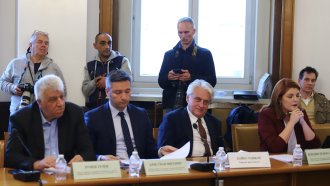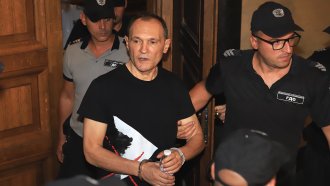Deadly Bus Crash Claims the Lives of 17, Road Agency Finally in Public’s Focus for Unsafe Roads and Three Ministers Resign
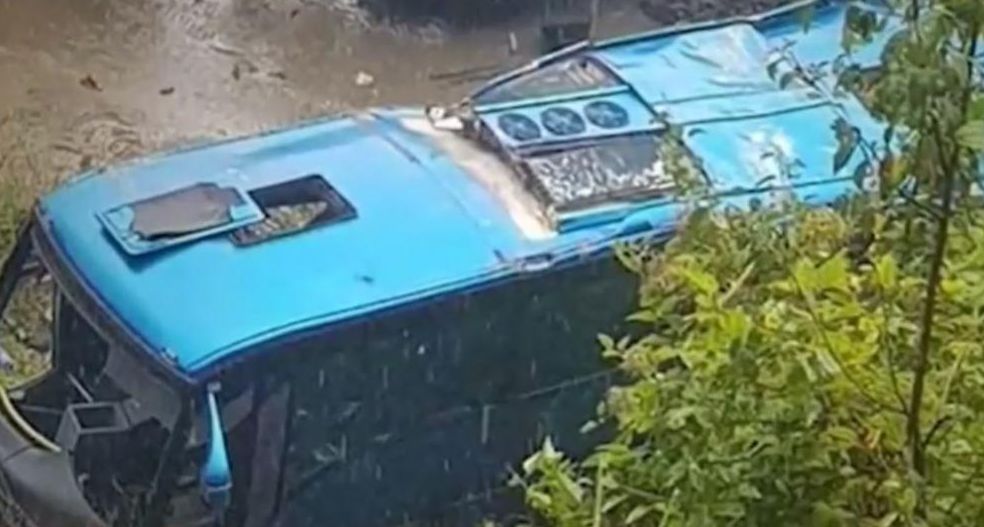
A bus carrying 33 passengers crashed and claimed 17 lives on its way back to the city of Svoge last Saturday. The bus was making its way back to the city from a trip to a nearby monastery. After a week of authorities’ failed attempts to assign the blame chiefly to the driver, PM Boyko Borissov finally requested and received three of his ministers’ resignations: those of Transport Minister Ivayko Moskovski, Minister of Interior Valentin Radev, and Minister of Regional Development Nikolay Nankov. According to Mediapool sources within the ruling party, GERB was reluctant for their ministers to resign as that would mean admitting guilt to the incident.
17 people lost their lives in the deadly crash; over 20 sustained injuries, a third of them - life-threatening. The driver of the bus, Grigor Grigorov, who is also the owner of the transport service company Mobilebus - 5, was also admitted to the hospital with head traumas.
The road where the accident took place runs along the Iskar defile. Initial reports claimed the bus went off the road, turned over, fell to the grounds below it and hit several cars along the way. The rain was pouring as the bus failed to take a very sharp turn, which ultimately resulted in the crash.
The day after the accident the National Investigative Office took over the case. The Prosecutor’s Office ordered a technical assessment state of the road and the quality of its materials. Road construction company Trace Svoge had repaired the road three years ago for 23 million euro. After the repairs, however, it exhibited defects. According to Regional Minister Nikolay Nankov the National Infrastructure Agency, which is responsible for the national road network, had requested the company fix the defects on five separate occasions but it did not comply.
Nikolay Mihaylov, who is the chair of the supervisory board of Trace Group Hold - a partner in the project for carrying out the road repairs - rejected the notion that the incident is because of poor road quality. He pointed out that the road agency was the one who had produced the technical specifications for the project, including what materials to use, implying that if the materials used were not of sufficient quality, that is not their fault.
However, the tests of the road showed Tuesday that the asphalt contained significant amounts of limestone, which should not be in there at all. Then-Minister Nenkov announced the news during a special press-conference and suggested Trace had falsified reporting documents to the road agency, which in turn had accepted the executed project with no objections. The question remains whether the road agency’s approval involved testing the material or if it had approved it only based on documentation.
At the same time, Trace Group holding issued a statement that using limestone in the compound is not wrong, and rejected Nikolay Nenov’s claims that they had refused to fix issues with the road five times. It said that Trace had begun repairs this Wednesday and that it had only received the request from the road agency the day before.
Doncho Atanassov, former head of the road agency, and a current member of its board told investigators on Friday that there had been “no oversights in the road agency’s work, which could have led to the crash.”
Early this week investigators said the state of the road is one line they were perusing.
The second was the fact that the bus’s roadworthiness test had expired at the beginning of August. And the third, that the driver had lost control of the bus.
This means prosecutors at the time were working on three hypotheses, as the head prosecutor, Sotir Tsatsarov, told journalists later: the driver caused the incident; the incident occurred due to poor road quality; the incident is a result of technical problems of the vehicle.
Even though the exact reasons, which led to the crash were not yet known at this point, and evidence had emerged that the authorities knew about road defects, Wednesday, prosecutors seemed convinced that the driver is the only one to blame for the crash.
The prosecutor in charge of the case, Diana Davidkova, presented three reasons the driver is guilty: one, he had driven 13 km over the speed limit (53 km/h with a limit of 40 km/h); two, the bus had entered the lane against traffic (although the reasons for this is ambiguous, as reports emerged about the Ministry of Interior alerting multiple times the road there has dangerously low traction and often leads to vehicles being unable to keep their lane); and last, Davidkova cited a witness who said she only remembers talking with the driver. The prosecutors are using this to show the driver was not paying full attention to the road. Davidkova did not specify whether the conversation happened at the time of the accident, however.
Davidkova did say that others may also be responsible for the accident but did not specify who.
The Sofia district judge, assigned to the case agreed with the prosecutors’ reasoning and put the driver under house arrest.
The driver’s lawyer dismissed the prosecutors' case as vague and highly speculative as there are too many factors surrounding the incident, which are not yet clear. Hristo Radkov from the Bulgarian Drivers’ Association told the Bulgarian National Radio that the authorities are trying to assign blame instead of establishing the cause of the incident, which is the road itself.
The political ramifications for the largest ruling party GERB, aside from the resignations of three of its ministers, for now seem to have significant potential.
Not only has the largest opposition party BSP been extremely vocal about the failure of this government to secure quality roads, but the member of the ruling coalition ATAKA leader Volen Siderov has also expressed outrage. He pledged to introduce law amendments to increase control of road construction procurement. He said he would request all government contracts with the infamous Trace Group Hold. The company was indeed one of the foremost beneficiaries of public procurements for road construction and repair, but their scope has declined over recent years, with other favorites taking their place.
Citizens of Svoge also began protests early in the week because of the poor quality of the roads and lack of consequences even when tests prove the asphalt used on the road is unfit for use. The organizer, Alexandar Slavkov, told BNR that the three ministers’ resignations are not enough and that the people who signed off on the road repairs must be found and held responsible.
Road construction has been the pride and joy of PM Boyko Borissov and his self-described greatest accomplishment during his three terms as PM. However, it has also been an open secret that public procurement for road construction always goes to several firms close to power, which do very low-quality work; roads tend to destruct as soon as work on them is finished, and they are either constantly being repaired over and over or left to deteriorate.
Tsarevo City Council Caught in Attempt to Allow Construction Project in Protected Area of Silistar

Silistar beach
Investigative reporting site Bivol.bg broke the story last Thursday that the next day Tsarevo City Council had intended to pass amendments to the land use plan for the area of Silistar beach. The modifications would allow for housing construction projects to begin across 22 decares (2,2 hectares) of land in the protected area of Strandzha National Park. The area in question is only about 500 meters off the beach.
Strandzha National Park is part of the European NATURA 2000 network and is a frequent and often leading component of public debate, with the never-fading real estate investment appetites for the last remaining undeveloped chunks of land along the Bulgarian coast.
As soon as the news about the decision broke, experts were swift in asserting that the plan contradicts several laws because of the unique status of the territory. First, the area falls within the boundaries of a national park, and second, it is part of NATURA 2000, so ecological and territorial laws protect it at both national and European levels. This is more than enough but in addition, the law prohibits adopting such investment plans prior to the approval of a general land use plan, which the municipality of Tsarevo has not done at the time of this vote. Aside from this, a decision to build on this territory would contradict two other official municipal land use plans, which do not provide for any part of these territories to be used for anything more than for camping. Even that is not yet allowed as authorized bodies still need to carry out an environmental impact assessment, which would give it the final go-ahead.
Regardless, the Council passed the plan Friday morning with the overwhelming support of nine out of its thirteen members, all of whom members of the PM’s and largest ruling party, GERB.
In the following hours, the news had already spread and stirred up public opinion almost to a boiling point. Ecological causes, especially concerning construction projects on the coast or in mountain areas are the ones with the highest potential to get people out on the streets in a matter of hours. They are also often initiated or backed by oligarchs or entities close to power and are in general a hallmark of high-level corruption. The government has maybe become more vigilant in such cases and tends to be watchful for the degree of discontent such decisions spike.
Several hours after the Council passed the proposal, Prime Minister Boyko Borissov told the mayor of Tsarevo, Georgi Lapchev (also from GERB), to "hold off" on the plans to build. The PM's press office released a statement requesting Lapchev not to carry out the Council's decision "until the public is fully convinced the decision is justified". The request could be nothing more than a suggestion as a city council is an elected body of the local government and municipal legislator. It is separate from the state government and neither the PM could issue an order to it, nor do mayors have the authority to override the legislator's decisions on their own accord. The only way a municipal council decision could be blocked is by the governor of the district – in this case – of Burgas.
According to the coalition of green NGOs and CSOs, "For the Nature", the case of adopting such a plan in Tsarevo is an elaborate scheme not just for taking over this particular 22 decars of land for real estate development. If carried out, the case will set a dangerous precedent, which the rest of the landowners in the area will take advantage of and ultimately urbanize all of it.
Tsarevo Mayor Georgi Lapchev announced he would hold a special press conference on Saturday to address the issue. On it, he declared that the story about the City Council passing a plan allowing real estate development in Silistar was fake news. He blamed the opposition for leaking false stories for a political dividend. He explained that the plan, in fact, concerned a property "more than half a kilometer off the coast". Also, he added, the plan is not about developing new real estate, but for rehabilitating an abandoned long-lost road, which went through that territory, and is currently absent from the municipal documentation. The road passes through the 22 decars private land in question. There is a provision that allows for two-stories summer houses but those, according to the mayor, are in the plan only to ensure development would be restricted to the area along the road.
Lapchev assured reporters that there was no investment plan for housing construction introduced to the City Council before the vote the previous day; there was not even an investment intent that the Council knew about. Another fake story, he said, was that the territory in question falls within the national park's boundaries (which it does).
Overall the press-conference and message, designed to convince and calm the public the protected area will not be urbanized were sloppy at best. As short as the message was, it was overflowing with inner ambiguities. The whole story about construction in Silistar is a lie, the plan just allows for houses to be built, but only along a road, which is both there and not there and needs to be built. And, actually, the point of the houses, which will be only two stories high, is to protect the area from further development.
By Wednesday the following week, PM Boyko Borissov had remembered the chain of command in Bulgarian state and local government and ordered the governor of the district of Burgas to block Tsarevo’s decision to allow building in and around Silistar. One day later, the Prosecutor’s Office of Burgas did the same.
The government’s press office issued a statement explaining that they would assess the best way to approach the case: they would explore the options of appeal, returning the decision to the Council for revision or attacking the decision through the local Prosecutor’s Office.
Valcho Cholakov, the governor of the district of Burgas told Mediapool he will follow the PM’s request once he receives the official documentation. On the same day, the regional office of the Ministry of Environment announced on its website that the Tsarevo City Council’s decision violates several territorial and environmental laws. It also skipped the requirement to pass such decisions only after the relevant authorities carry out an environmental impact assessment and to submit it to the regional office of the Ministry of Environment before passing it.
The head of the regional office of the Ministry of Environment, Tonka Atanassova, has also informed the Ministry of Regional Development about the case but it has not yet expressed a position on it.
Both regional institutions can’t act before the administration of Tsarevo submits the official documentation concerning the case.
A week after the story broke, Environmental Minister Neno Dimov finally commented on the situation. He told reporters that “not everything is prohibited in Silistar but not everything is permitted”. He downplayed the scandal, saying that the administration of Tsarevo had failed to submit the plan to the regional office of the Ministry of Environment prior the vote, which would not be required if the territory were “normal”. He refused to comment any further.
After 17 Days Offline, the Trade Registry is Finally Up
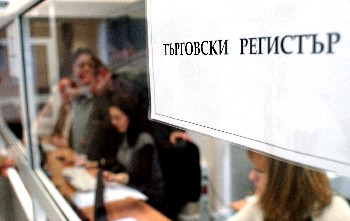
The Trade Registry finally went online after being down for 17 full days. The system crashed on August 10 and was restored on August 27. This is the longest period the Trade Registry was down in 11 years.
The official explanation of the authorities is disk failure of four of the Registry’s drives, affecting 25 TB of data.
What was worse, however, is that the backup systems also failed.
The Registry is crucial for conducting business in Bulgaria as most deals and changes in the status of private companies must submit them to the Registry, otherwise, they could not be finalized. The Registry also holds the documentation of non-profits as of this year as well.
The unprecedented crash did not result in any notable political crisis. While it did lead to the Registry Agency’s head’s resignation, her successor would hardly bring any change. Moreover, it was established that both women, former head Zornitsa Daskalova and Gabriela Kozareva, seem connected with controversial MP and media mogul Delyan Peevski.
Energy Minister Temenuzhka Petkova Confident there will be an Investor for NPP Belene in 2019

According to Energy Minister Temenuzhka Petkova, it is realistic for the government to have selected a strategic investor for building NPP Belene by early 2019.
The Parliament approved the decision to renew the NPP Belene project in June. Petkova has until the end of 2018 to conduct a procedure for selecting a strategic investor. If an investor is selected the construction of the plant will begin.
Petkova announced her optimistic forecast during a meeting with Chinese energy experts on Wednesday. Among them were representatives of the China National Energy Administration, the State Nuclear Power Technology Corporation Ltd., China General Nuclear Power Group and China National Nuclear Corporation. The latter has expressed several times its interest in NPP Belene should the Bulgarian government decides to renew it.
Petkova said that realizing NPP Belene could be an opportunity for expanding cooperation in the energy sector between the two countries.
Parliament will Likely Repeal Machine Voting and Cite the Election Commission as the Cause
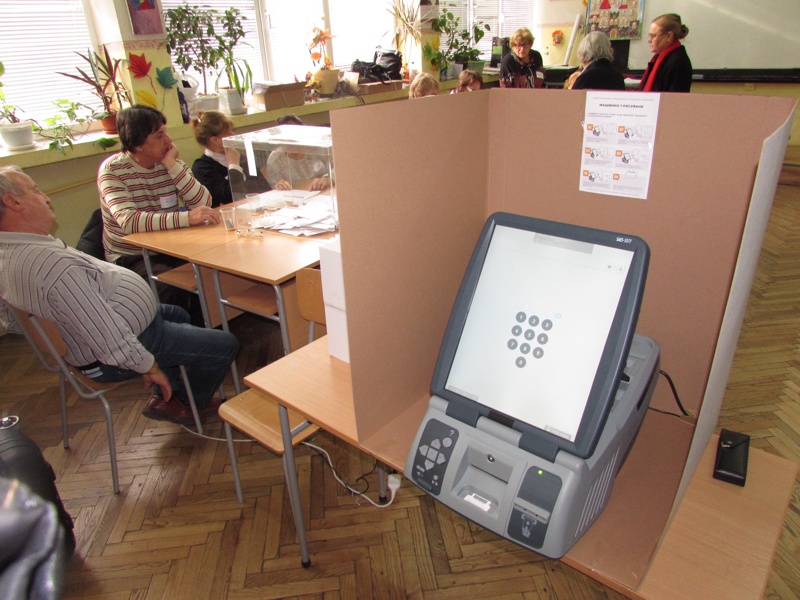
In the wake of the new parliamentary season, sources tell Mediapool that Parliament will likely appeal machine voting and point to the Central Election Commission as the cause.
Recently the High Administrative Court ruled the commission would have to implement machine voting in every voting section within six months. The commission is appealing the decision but also opened a procurement for assessing the cost of the implementation. The procedure is in place should the appeal fail, which it almost inevitably will if Parliament does not amend the Elections Act and drop the articles about machine voting. The procurement aims to provide an estimate of how much would the purchase or long-term rental of at least 12’500 machines cost, and estimate logistics’ and support costs.
The commission has said time and again that it has not the resources to carry out the court’s ruling within the timeframe provided by the court.
The Elections Act provides for machine voting options be available in all voting sections before the last elections, which the commission has failed to fulfill. The executive and legislative branch have left the task to the commission even though it has repeatedly stated it lacks the capacity to carry it out. Moreover, the commission itself does not have the authority to decide how much money to spend, as the executive branch could allocate the funds for it, nor how and where to store the machines when there are no elections.
This seems a good opportunity for the majority to do away with the articles in the Elections Act altogether, not only regarding machine voting but also the ones providing for implementing electronic voting, which should be available in 2019.
За честна и независима журналистика
Ще се радваме, ако ни подкрепите, за да може и занапред да разчитате на независима, професионална и честна информационно - аналитична медия.
 0 коментара
0 коментара
Екипът на Mediapool Ви уведомява, че администраторите на форума ще премахват всички мнения, съдържащи нецензурни квалификации, обиди на расова, етническа или верска основа.
Редакцията не носи отговорност за мненията, качени в Mediapool.bg от потребителите.
Коментирането под статии изисква потребителят да спазва правилата за участие във форумите на Mediapool.bg
Прочетете нашите правила за участие във форумите.
За да коментирате, трябва да влезете в профила си. Ако нямате профил, можете да се регистрирате.


